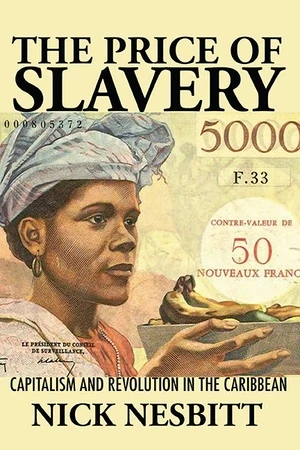Nick Nesbitt
University of Virginia Press,
2022

|
Perspective:
|
Marxian Political Economy
|
| Topic: |
Criticism of Capitalism,
Economic History,
Race & Gender
|
| page count: |
274 pages
|
| ISBN: |
9780813947099 |
Blurb
The Price of Slavery analyzes Marx's critique of capitalist slavery and its implications for the Caribbean thought of Toussaint Louverture, Henry Christophe, C. L. R. James, Aimé Césaire, Jacques Stephen Alexis, and Suzanne Césaire. Nick Nesbitt assesses the limitations of the literature on capitalism and slavery since Eric Williams in light of Marx's key concept of the social forms of labor, wealth, and value. To do so, Nesbitt systematically reconstructs for the first time Marx's analysis of capitalist slavery across the three volumes of Capital. The book then follows the legacy of Caribbean critique in its reflections on the social forms of labor, servitude, and freedom, as they culminate in the vehement call for the revolutionary transformation of an unjust colonial order into one of universal justice and equality.
This book ist part of the alternative reading list 2022 by Diversifying and Decolonising Economics (D-Econ). The editors comment has been provided by D-Econ and can also be found on the list, which was compiled by Devika Dutt, Danielle Guizzo, and Ingrid Kvangraven.
Comment from our editors:
What is the role played by slavery in the development of capitalism? Nick Nesbitt revisits this question by examining Marx’s analysis of slavery across his seminal Capital. In addition, he outlines the writings of key figures in what he calls the Black Jacobin Marxist critical tradition, such as Toussaint Louverture, Henry Christophe, C.L.R. James, Aime Cesaire, Jacques Stephen Alexis, and Suzanne Cesaire, and argues that the critique of slavery, colonialism, and capitalism can be understood in terms of Marx’s social forms. He argues that even though slave-based production was crucial for the development of capitalism, in the Marxist sense, slavery was an unproductive system, that is, it does not contribute surplus value to the process of accumulation. Nonetheless, production by slave labor captures massive average profits for production even if they do not produce surplus value. He also takes the reader through the Black Jacobin thought on revolutionary overthrow of slavery, Antillean plantation slavery and competing social forms, and critiques of colonial forms of labor and the state. Nesbitt produces a theoretical articulation of slavery and capitalism that is illuminating and worth a read.
This material has been suggested and edited by:


